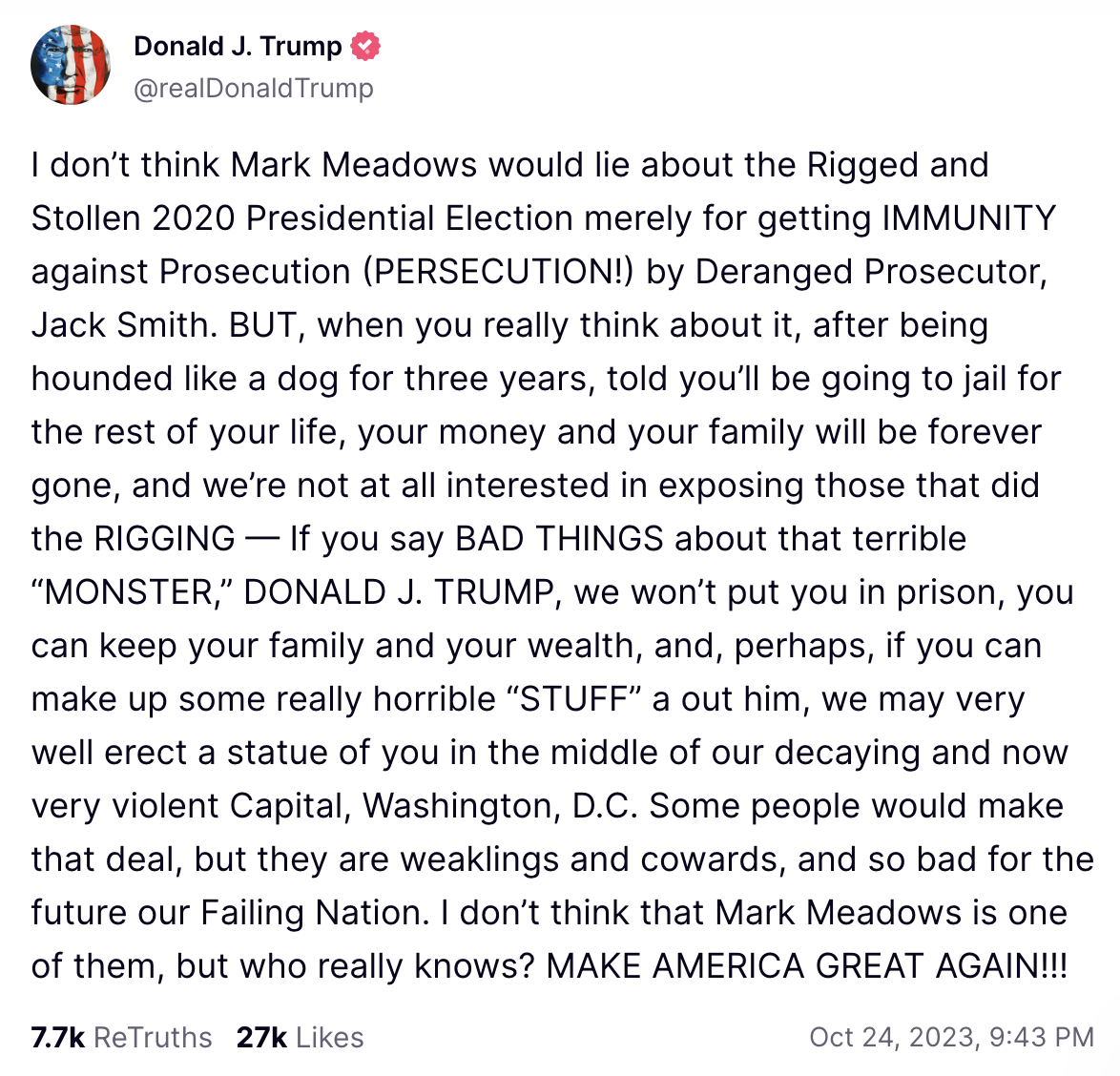[ad_1]

(Photo by Win McNamee/Getty Images)
This morning Donald Trumps appeal of the gag order imposed by Judge Tanya Chutkan in his election interference case reached the US Circuit Court for the District of Columbia. The hearing was slotted for 40 minutes, but stretched past two hours as the panel beat Trump’s lawyer D. John Sauer like a tambourine, followed by a vigorous (but not humiliating) interrogation of assistant special counsel Cecil VanDevender.
You can listen to — but not watch! — Judges Patricia Millet, Cornelia Pillard, and Brad Garcia here:
Judge Chutkan found that Trump’s social media statements “pose a significant and immediate risk” of intimidating witnesses and turning attorneys and court staff into “targets for threats and harassment.” The trial court applied the “substantial likelihood of material prejudice” standard set out by the Supreme Court in Gentile v. State Bar of Nevada, 501 U.S. 1030 (1991), and ruled in relevant part:
All interested parties in this matter, including the parties and their counsel, are prohibited from making any public statements, or directing others to make any public statements, that target (1) the Special Counsel prosecuting this case or his staff; (2) defense counsel or their staff; (3) any of this court’s staff or other supporting personnel; or (4) any reasonably foreseeable witness or the substance of their testimony.
As he has from the beginning, Trump simply argued that Gentile didn’t apply to him, as the plaintiff in that case was an attorney, not the defendant. Instead he insists that the Brandenburg incitement standard is the appropriate metric. As Judges Millet and Pillard pointed out, this would mean that Trump — and every other defendant — would have to actually commit a crime to violate the gag order, rendering it a nullity.
Indeed, Judge Millet became so exasperated after fifty minutes of Sauer flatly refusing to answer her hypotheticals that she was actually yelling. For instance, the court wondered why it would be illegal for Trump to call Mark Meadows up and say “don’t testify,” but permissible for him to post this on Truth Social:

Sauer similarly insisted, as he’d done in his briefs, that the woman indicted for making death threats to Judge Chutkan didn’t count because that was all the way back in August, before Trump really got rolling with his “constant” attacks on witnesses and prosecutors.
None of Sauer’s answers were “good,” as that word is traditionally understood, and he doggedly refused to grapple with the court’s attempt to balance Trump’s First Amendment right to engage in political speech and the the trial court’s need to protect its proceedings. In his telling, the court has no more authority to restrain Trump than it does to muzzle the press — he is essentially in an analogous position to a non-party.
When Devender came to the podium, he pointed out that courts clearly have greater authority over parties to a case than over counsel or media — they can literally take away their liberty and lock them up pending trial. But he was unable to point to clear test for balancing Trump’s right to respond to attacks by his political enemies with the fairness of the trial. Judge Millet pressed the prosecutor on the difference between calling former attorney general Bill Barr a “slimy liar” and saying he is telling untruths. How could the first be banned and the second be permissible? VanDevender didn’t have a great answer there, and may regret failing to take the maximalist position that Trump’s position as a political candidate must be subordinated to the needs of the court.
The implicit assumption baked into in the question is that Trump has a legal right to be treated differently from every other defendant because he’s running for office. If Bill Barr goes on the Sunday shows and says Trump is an ignorant, selfish despot, then Trump must have a right to respond, even if that has the effect of diminishing the credibility of a witness. This is an explicit rejection of Judge Chutkan’s promise to treat the former president like anyone else appearing before her.
The panel judges also honed in on what was widely seen as one of the weakest parts of the gag order: its prohibition on criticizing the prosecutors.
“It can’t be that he can’t mention Mr. Smith,” Judge Pillard pressed. “Surely he has a thick enough skin … I have little doubt that he would not be dissuaded.”
After watching VanDevender get smacked around, Sauer wisely declined to return to the podium to remind the judges just how much his argument sucked. And with that, the hearing was adjourned.
US v. Trump [Circuit Docket via Court Listener]
Liz Dye lives in Baltimore where she writes about law and politics.
[ad_2]




